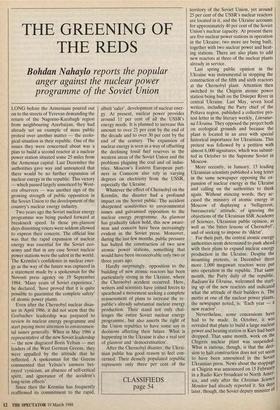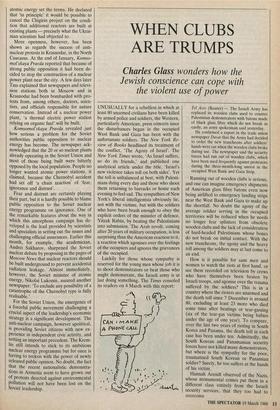THE GREENING OF THE REDS
Bohdan Nahaylo reports the popular
anger against the nuclear power programme of the Soviet Union
LONG before the Armenians poured out on to the streets of Yerevan demanding the return of the Nagorno-Karabagh region from neighbouring Azerbaijan, they had already set an example of mass public protest over another matter — the ecolo- gical situation in their republic. One of the issues they were concerned about was a plan to build a second reactor at a nuclear power station situated some 25 miles from the Armenian capital. Last December the authorities gave way and announced that there would be no further expansion of nuclear energy in the republic. This victory — which passed largely unnoticed by West- ern observers — was another sign of the growing strength of public opposition in the Soviet Union to the development of the country's nuclear energy industry.
Two years ago the Soviet nuclear energy programme was being pushed forward at breakneck speed. In those pre-glasnost days dissenting voices were seldom allowed to express their concern. The official line was that the rapid expansion of nuclear energy was essential for the Soviet eco- nomy and that in any case Soviet nuclear power stations were the safest in the world. The Kremlin's confidence in nuclear ener- gy as the way of the future was captured in a statement made by a spokesman for the Novosti press agency on 19 September 1984. 'Many years of Soviet experience,' he declared, 'have proved that it is quite possible to guarantee the complete safety' of atomic power plants.
Even after the Chernobyl nuclear disas- ter in April 1986, it did not seem that the Gorbachev leadership was prepared to review its nuclear energy programme and start paying more attention to environmen- tal issues generally. When in May 1986 a representative of the new Soviet leadership — the now disgraced Boris Yeltsin — met leaders of the West German Greens, they were appalled by the attitude that be reflected. A spokesman for the Greens commented that Yeltsin's answers bet- rayed 'cynicism, an absence of self-critical spirit, and ignorance of the accident's long-term effects'.
Since then the Kremlin has frequently reaffirmed its commitment to the rapid, albeit 'safer', development of nuclear ener- gy. At present, nuclear power provides around 11 per cent of all the USSR's energy needs. It is planned to increase this amount to over 21 per cent by the end of the decade and to over 30 per cent by the end of the century. The expansion of nuclear energy is seen as a way of offsetting the declining fossil fuel reserves in the western areas of the Soviet Union and the problems plaguing the coal and oil indus- tries. Moscow's Eastern European part- ners in Comecon also rely in varying degrees on electricity from the USSR, especially the Ukraine.
Whatever the effect of Chernobyl on the Kremlin, the disaster had a profound impact on the Soviet public. The accident sharpened sensitivities to environmental issues and galvanised opposition to the nuclear energy programme. As glasnost has gradually taken hold, this new aware- ness and concern have been increasingly evident in the Soviet press. Moreover, during the last few months, public pressure has halted the construction of two new atomic power stations, something that would have been inconceivable only two or three years ago.
Hardly surprisingly, opposition to the building of new atomic reactors has been particularly strong in the Ukraine, where the Chernobyl accident occurred. Here, writers and scientists have joined forces to spearhead a movement seeking a complete reassessment of plans to increase the re- public's already substantial nuclear energy production. Their stand not only chal- lenges the entire Soviet nuclear energy programme, but also asserts the right of the Union republics to have some say in decisions affecting their future. What is happening in the Ukraine is also a real test of glasnost and 'democratisation'.
After the Chernobyl disaster, the Ukrai- nian public has good reason to feel con- cerned. Their densely populated republic represents only three per cent of the territory of the Soviet Union, yet around 25 per cent of the USSR's nuclear reactors are located in it, and the Ukraine accounts for approximately 40 per cent of the Soviet Union's nuclear capacity. At present there are five nuclear power stations in operation in the Ukraine; two more are being built, together with two nuclear power and heat- ing stations. There are also plans to add new reactors at three of the nuclear plants already in service.
Last spring public opinion in the Ukraine was instrumental in stopping the construction of the fifth and sixth reactors at the Chernobyl plant. Attention then switched to the Chigirin atomic power station being built on the Dnieper River in central Ukraine. Last May, seven local writers, including the Party chief of the Poltava region, published a collective pro- test letter in the literary weekly, Literatur- na Ukraina. They opposed the project both on ecological grounds and because the plant is located in an area with special historical importance for Ukrainians. This protest was followed by a petition with almost 6,000 signatures, which was submit- ted in October to the Supreme Soviet in Moscow.
More recently, in January, 13 leading Ukrainian scientists published a long letter in the same newspaper opposing the ex- pansion of nuclear energy in the Ukraine and calling on the authorities to think again. Without mincing words, they ac- cused the ministry of atomic energy in Moscow of displaying a 'belligerent, bureaucratic' attitude, of ignoring the objections of the Ukrainian SSR Academy of Sciences, Ukrainian public opinion, as well as 'the bitter lessons of Chernobyl', and of seeking to impose its 'diktat'.
For their part, the central atomic energy authorities seem determined to push ahea with their plans to expand nuclear energy production in the Ukraine. Despite the mounting protests, in December three more 1,000 megawatt reactors were put into operation in the republic. That same month, the Party daily of the republic, Radyans'ka Ukraina, welcomed the start- ing up of the new reactors and indicated what the attitude of their builders is. The motto at one of the nuclear power plants, the newspaper noted, is: 'Each year — a new reactor'.
Nevertheless, some concessions have had to be made. In October, it was revealed that plans to build a large nuclear power and heating station in Kiev had been dropped. That same month, work on the Chigirin nuclear plant was suspended. What is curious, though, is that the deci- sion to halt construction does not yet seem to h'ave been announced in the Soviet Ukrainian press. News about the stoppage at Chigirin was announced on 15 FebruarY in a Radio Kiev broadcast to North Amer- ica, 'and only after the Christian Science Monitor had already reported it. Six days later, though, the Soviet deputy minister of atomic energy set the terms. He declared that 'in principle' it would be possible to cancel the Chigirin project on the condi- tion that additional reactors are built at existing plants — precisely what the Ukrai- nian scientists had objected to.
More openness, however, has been shown as regards the success of anti- nuclear protests in Krasnodar, in the North Caucasus. At the end of January, Komso- mol'skaya Pravda reported that because of strong public opposition it had been de- cided to stop the construction of a nuclear power plant near the city. A few days later Tass explained that newspapers and televi- sion stations both in Moscow and in Krasnodar had been bombarded with pro- tests from, among others, doctors, scien- tists, and officials responsible for nature conservation. Instead of a nuclear power plant, 'a thermal electric power station relying on organic fuel' will be built. Komsomol'skaya Pravda revealed just how serious a problem for the Soviet authorities public opposition to nuclear energy has become. The newspaper ack- nowledged that the 20 or so nuclear plants already operating in the Soviet Union and most of those being built were bitterly opposed by the local population. People no longer wanted atomic power stations, it claimed, because the Chernobyl accident had set off 'a chain reaction' of 'fear, ignorance and distrust'.
Fear and distrust are certainly playing their part, but it is hardly possible to blame public opposition to the Soviet nuclear energy programme on ignorance. One of the remarkable features about the way in which this amorphous campaign has de- veloped is the lead provided by scientists and specialists in setting out the issues and challenging official assurances. Earlier this month, for example, the academician, Andrei Sakharov, • sharpened the Soviet nuclear debate by proposing in the pages of Moscow News that nuclear reactors should be built underground to prevent accidental radiation leakage. Almost immediately, however, the Soviet minister of atomic energy, Nikolai Lukonin, assured another newspaper: 'To exclude any possibility of a catastrophe of the Chernobyl type is fully realisable.'
For the Soviet Union, the emergence of a forceful public movement challenging a crucial aspect of the leadership's economic strategy is a significant development. The anti-nuclear campaign, however apolitical, is providing Soviet citizens with new ex- perience in independent civic activity, and setting an important precedent. The Krem- lin still intends to stick to its ambitious nuclear energy programme but for once is having to reckon with the power of newly released public opinion. No doubt, the fact that the recent nationalistic demonstra- tions in Armenia seem to have grown out of protests directed against environmental pollution will not have been lost on the Soviet leadership.

























































 Previous page
Previous page